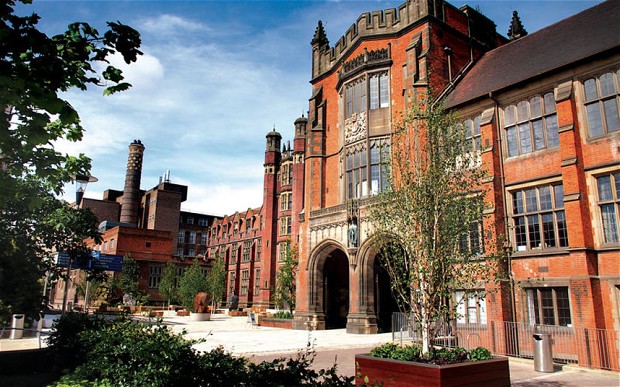The University can trace its origins to a School of Medicine and Surgery (later the College of Medicine), established in 1834, and to Armstrong College, founded in 1871 for the teaching of physical sciences.
These two colleges formed one division of the federal University of Durham, the Durham Colleges forming the other division. The Newcastle Colleges merged to form King's College in 1937. In 1963, when the federal University was dissolved, King's College became the University of Newcastle upon Tyne, and latterly, Newcastle University.
The first Chairs at the Colleges were not only in fundamental disciplines such as mathematics, chemistry, physics, arts and literature, but also in the regionally important applied sciences such as geology, mining, naval architecture, engineering and agriculture. Newcastle became a brand name worldwide, known as a hub of industrial activity, with a strong civic university as its intellectual underpinning.
The combination of being globally ambitious and regionally rooted underpins Newcastle University’s vision for the future.
We believe in, and strive for, world-class academic excellence – but excellence with a purpose.
We work not only on the supply side of knowledge creation and dissemination, but also respond to the demand side of societal challenges. We are not only a large employer and a magnet for tens of thousands of young people, but an integral part of civil society. That is the hallmark of a civic university.
We believe that our success as a civic university will in itself become an exportable commodity, since the search for such a combination of global excellence and local relevance is one replicated in many places in the world.
Our mission is to:
· be a world-class research-intensive University
· deliver teaching and facilitate learning of the highest quality
· play a leading role in the economic, social and cultural development of the North East of England
Newcastle University is a Russell Group University and we ranked 18th out of 121 in The Times and Sunday Times Good University Guide 2014 and third in the North East and Yorkshire.
Newcastle is ranked:
· to 5th in the UK for employability (amongst comparator universities (Higher Education Statistics Agency))
· in the UK’s top 12 for research power in science and engineering
· ranked 8th for Medical research power
We have a world-class reputation for research excellence and are spearheading three major societal challenges that have a significant impact on global society. These themes are: Ageing and Health, Sustainability, and Social Renewal.
The Quality Assurance Agency for Higher Education (QAA) commended our management of academic standards and quality of learning by giving us a 'judgement of confidence' – the highest rating available.
In 2013, we were awarded five QS Stars.
Newcastle University is the first UK university to establish a fully owned international branch campus for medicine at its NUMed Campus in Malaysia.
At Newcastle, we are committed to world-class academic excellence, as part of our vision to be a civic university.
Faculty of Humanities and Social Sciences
Faculty of Medical Sciences
Faculty of Science, Agriculture and Engineering
Academic Schools
· Agriculture, Food and Rural Development
· Architecture, Planning and Landscape
· Arts and Cultures
· Biology
· Biomedical Sciences
· Business School
· Chemical Engineering and Advanced Materials
· Chemistry
· Civil Engineering and Geosciences
· Combined Honours Centre
· Computing Science
· Dental Sciences
· Education, Communication and Language Sciences
· Electrical and Electronic Engineering
· English Literature, Language and Linguistics
· Geography, Politics and Sociology
· History, Classics and Archaeology
· Law School
· Marine Science and Technology
· Mathematics and Statistics
· Mechanical and Systems Engineering
· Medical Education
· Modern Languages
· Psychology
The English language test should have been taken within the preceding two years. We prefer the IELTS test but the Pearson’s PTE Academic is also acceptable.
We also recognise the English language standard achieved through qualifications such as:
If English is not your first language, you must provide evidence of your language ability when you apply.
At the current time, we will also accept ETS TOEFL IBT for entry in 2014. However, following recent announcements by the UK Home Office about the acceptability of TOEFL, it is possible that the UK Visa and Immigration Rules may change. Please check these pages for up-to-date information about the acceptability of TOEFL.
• European Baccalaureate
• International Baccalaureate
• School Leaving Certificates such as the Vitnemal (Norway) and similar qualifications from other Scandinavian countries
Include a copy of your IETLS test certificate (or equivalent) when you apply. We accept photocopies, faxes and scanned versions of all documentation. If an original certificate is required, you will be asked for this.
You will also take a short English language assessment when you arrive to work out if you need further English language support. If you are currently studying in a country where English is one of the official languages and you have the academic qualifications for your postgraduate programme, you will normally not need to take this English language assessment.
All international students who are offered a place to study on any of our postgraduate degree programmes are normally able to apply for at least one of our central University scholarships. You will be sent details at the appropriate time.
· Alumni Tuition Fee Discount
· Country Specific Scholarships
· International Family Discounts (IFD)
· Newcastle University International Postgraduate Scholarship (NUIPS)
· Newcastle University Overseas Research Scholarship (NUORS)
All University scholarships are awarded on the basis of academic merit, so you must possess (or expect to receive) excellent results. We hold a formal University Reception each year for our scholarship winners.
If you have any queries regarding any University awards, please contact university.
Please contact university for detailed information.


2014 © a2fairs. All Rights Reserved. powered by twopulse.com